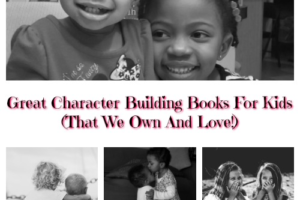35 Concepts Parents Should Teach To Younger Kids
The higher a building is, the deeper the foundation has to be to ensure it is a sturdy structure. In order to raise kids that grow up to embody characteristics to be admired, it is important we start building them during their foundation years. When they are but little sponges.![]()
However, before any words are spoken, we must first try to walk the road we would like our kids to travel. I say try because nobody is perfect. However, the efforts we put forth ourselves, is what we would get in return. After all, kids do what you do and never really what you say right.![]()
Here is a list of 35 concepts I am trying to teach to my kids from a young age. I understand that most may take a while for them to truly understand. But if we start while they are very young, the seed for true understanding would have already been planted.

- I love you. This could never be said enough. Knowing they are loved will build their confidence.
- God loves you. We want our kids to know that they have a heavenly father and that they are loved by him!
- I was wrong. Be willing to admit even when you’re wrong. They’ll be willing to do the same.
- I am sorry. Similarly, if you apologize when needed, they’re learning that they should to.
- Use your words. This builds the foundation for proper communication, and helps in brain development.
- Yes/No. It is important to teach kids how to correctly use yes and no, and this also is another great foundation for good communication skills as they get older.
- Work before play. Now wait! Before you think this seems a bit extreme, you would be surprised how even our three-year old has grasped this concept! Our three and five-year old both understand for example if they want to go play with their toys, they need to put their books back on the shelf. All we have to say is “Because” and they both shout out “work before play!” Do they do it perfectly? Huh no! But they have grasped the idea that is how it should be. So the discipline will come as they get older.
- Say Please. It teaches good manners and prevents against the feeling of entitlement.

- Thank You. Teaches them good manners and how to be grateful.
- You’re welcome. Another one teaching them how to be courteous.
- Excuse me. Teaches them how to interrupt appropriately.
- I missed you. When needed this would provide comfort, resulting in happier, more secure kids.
- You tried really hard with that. Praise the process not the person. There is research in favor of this approach as suppose to saying your so smart at everything they do. It increases motivation and helps in handling failure.
- Have fun! By teaching our kids to focus more on the process of having fun, we hope to teach them to focus on what’s important, which is to have fun! They will also learn from this, how to be a humble winner and a good loser.
- Do not speak and eat at the same time. For good table manners. Plus we don’t want them to choke right!

- Wait your turn. We want them to be fair with each other and others. And a great part of that is know how to give others a turn to speak or play.
- Tell the truth. Instill the importance of honesty early. Halfway there…..
- I forgive you. Forgiving others is really difficult to do when you are still feeling hurt. However we want them to know it shows how brave and strong they are to forgive someone.
- Be careful. Help them to be aware of the dangers of not having limits from a young age.
- Time-out. This will help them to start correlating bad behaviors with consequences.
- Drop the subject. OK, so this sounds harsher than it is in actuality.
 It’s a call to gently encourage them to learn to not get into arguments with you, over matters you have made a judgement call on. This book explains the concept really well, in a kid friendly manner.
It’s a call to gently encourage them to learn to not get into arguments with you, over matters you have made a judgement call on. This book explains the concept really well, in a kid friendly manner.
- That item is not free, we have to pay for it. We don’t want them picking up everything they see thinking it’s there’s. Give them an early concept of money. Although they need not be stressed about the woes of money at such a tender age, it will help in them to get the idea of “delayed gratification”.
- Pick up your toys. Develops the skill of cleaning up after themselves. this will promote cleanliness and generally being more organized.
- You have enough toys. Teach them not to always want more! But more importantly, studies shows it encourages them to use more of their imagination, and concentrate and communicate better. (OK, I need to get on this on asap!
 )
) - Try this food. Even though this can be tricky with picky eaters, it will encourage them to make healthier food decisions. You will have to motivate them however. The easiest way to do this would be to lead by example.

- Don’t waste food. From a young age find creative ways to teach them why they should not waste food.
- Don’t talk to strangers. Because young kids don’t have very good impulsive judgement yet, the goal is to start with showing them family members and friends that are OK to be around. Help them to understand they should not talk to strangers if you are not around.
- Nobody is to touch you. We want them to know that their body belongs to them and nobody can touch it without their permission. Open and direct communication at an early age about “private body parts”, will help them understand what is not allowed. We want them to know they can refuse a kiss or a touch, even from a person they love.
Because at this age they may not always recognize appropriate and inappropriate touching, we want to give them at least an idea of when they should let mommy and daddy know they were made to uncomfortable. This concept will also teach them they should not touch others as well. - Brush your teeth. I tell my girls to brush all the teeth they want to keep.
- Be nice to others. Early biblical concept: do unto others as you would have them do unto you!

- Was that very nice? Help them to think about their actions.
- Make your bed. It starts to teach cleanliness and responsibility. At a very young age the focus is less on how well its done, and just the lesson behind the action.

- Go play. Have fun! Get some exercise! Besides, life gets busy really quickly as you start to get older, enjoy as much play now!
- Yes/No mom, Yes/No dad. I don’t mean this in a military style way.
 But more so, at the appropriate time, you’re teaching them to respect you as an adult, which prepares them for respecting their elders.
But more so, at the appropriate time, you’re teaching them to respect you as an adult, which prepares them for respecting their elders. - Do not tattletale. Although their tattling may be annoying
 , it’s also an opportunity to help them learn how to resolve problems on their own and how to stand up for others. It’s important we do pay attention to it because it can alert to urgent situations (this is so true!
, it’s also an opportunity to help them learn how to resolve problems on their own and how to stand up for others. It’s important we do pay attention to it because it can alert to urgent situations (this is so true! )and also for them to know they can always come to us. The challenge is striking a balance between their not yet developed emotional and social skills and teaching them to find other ways to resolve issues.
)and also for them to know they can always come to us. The challenge is striking a balance between their not yet developed emotional and social skills and teaching them to find other ways to resolve issues.
What early concepts do you see as important to teach to younger kids? What are your thoughts do you have on those included on this list?… I would love to hear your ideas in the comment section below!!![]()












14 Comments
Leave your reply.